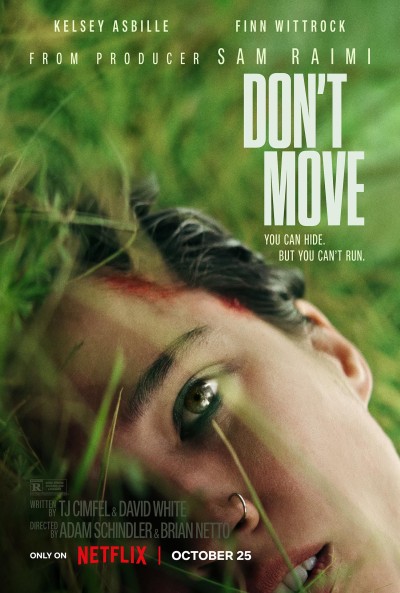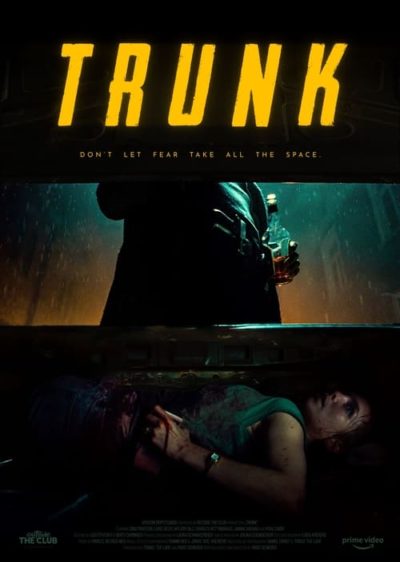★★★
“Not grand, but adequate.”
 Despite my relentlessly commitment to sit through any film with an action heroine that strays across my radar, I’ll admit to suppressing an inward wince, when the film started and the ‘Lifetime Movies’ logo popped up. This origin was news to me. However, I was literally a captive viewer, since I was sitting on a plane to Mexico, so couldn’t exactly pop up and put on something else. At least it did mean I wasn’t going to end up uncomfortably trying to hide my screen from fellow passengers. This has occasionally happened previously, after an ill-considered choice of in-flight entertainment. Inevitably when I’m occupying the middle seat. Say what you like, Lifetime TVMs are safe.
Despite my relentlessly commitment to sit through any film with an action heroine that strays across my radar, I’ll admit to suppressing an inward wince, when the film started and the ‘Lifetime Movies’ logo popped up. This origin was news to me. However, I was literally a captive viewer, since I was sitting on a plane to Mexico, so couldn’t exactly pop up and put on something else. At least it did mean I wasn’t going to end up uncomfortably trying to hide my screen from fellow passengers. This has occasionally happened previously, after an ill-considered choice of in-flight entertainment. Inevitably when I’m occupying the middle seat. Say what you like, Lifetime TVMs are safe.
And to my surprise, in this case, reasonably entertaining. Admittedly, expectations were low. However, this kept my attention. Not that I could exactly walk out. But it keeps things simple, and is the better for it. To mark the twentieth anniversary of their friendship, pediatrician Brooke (Vitori) and photographer Chandra (Rosita) decide to do something special and hike the Grand Canyon. They bump into guide Nate (Boyd), who convinces them to go off trail and see hidden delights. As the title suggests, big mistake. For he is actually in need of a doctor who can tend to a nasty, infected leg wound suffered by extremely reluctant fiancée Tara (Bailey), and won’t take no for an answer, from any of the three women.
Nothing new in the plotting here (there’s another Lifetime film with a suspiciously similar premise, Vanished in Yosemite), but it does a decent job of avoiding character idiocy often needed in many of this sort of thing. Chandra is established early on as the risk-taker, so it makes sense when she immediately accepts Nate’s offer, over the objections of the much more cautious Brooke. This, too, is understandable as she lost her husband in a climbing accident two years previously. Yet despite the disparate personalities, the friendship between them is sold by the actresses’ performances. It gives a solid foundation, so that the occasionally rocky plotting doesn’t end up causing the whole endeavour to collapse. By the end, both have clearly changed and moved towards the middle, a nice acknowledgement of moderation being the best policy. Boyd does his part too, initially making Nate seem charming, until the inevitable – for anyone who has seen a man in a Lifetime movie, anyway – heel turn.
I do suspect not all of it was actually filmed in the Grand Canyon. The stuff at the rim, certainly. But they’re shown entering the National Park, before arriving at the Sugar Loaf Lodge, which is actually in Sedona, a good hundred miles south. Some of the scenery looks more like Utah as well. However, you can’t go wrong with the Grand Canyon. It looks as majestic and imposing as ever, adding value to the production. Weirdly, it ends up being the second film I’ve seen this week, after Deep Fear, where a flare gun is wielded for offensive purposes. What are the odds?
Dir: Derek Pike
Star: Gina Vitori, Philip Boyd, Katrina Rosita, Ryann Bailey
A version of this review originally appeared on Film Blitz.





 Eden Murphy (Miller) has a problem. She desperately wants to get into Pembroke College, but is currently on the wait list. However, classmate Barrett Schroder (Heller) has a congressman for a father, a letter from whom would surely push her application forward. Barrett isn’t exactly helpful, so along with friend Zara (Milliner), she crashes his party, hoping to press her case. A series of events ensue, resulting in Eden being trapped in a bedroom with a passed-out drunk Zara, and a phone belonging to one of Barrett’s friends, Gooch (Deusner). This has some incriminating video footage on it, apparently linking Barrett to the recent disappearance of another classmate. He is
Eden Murphy (Miller) has a problem. She desperately wants to get into Pembroke College, but is currently on the wait list. However, classmate Barrett Schroder (Heller) has a congressman for a father, a letter from whom would surely push her application forward. Barrett isn’t exactly helpful, so along with friend Zara (Milliner), she crashes his party, hoping to press her case. A series of events ensue, resulting in Eden being trapped in a bedroom with a passed-out drunk Zara, and a phone belonging to one of Barrett’s friends, Gooch (Deusner). This has some incriminating video footage on it, apparently linking Barrett to the recent disappearance of another classmate. He is  El Jardinero
El Jardinero A somewhat gimmicky but adequately competent Netflix Original, I guess the moral here is that being abducted and stalked by a serial killer is the best kind of therapy. We meet Iris (Asbille) in the remote woods where her young son previously died. She never recovered, and is now standing on edge of a cliff, contemplating suicide. She’s interrupted by the arrival of a stranger, Richard (Wittrock), who talks her down. However, it turns out he has an ulterior motive: he wants to be the one to kill Iris. He tazes her, and while subsequently managing to escape, she has also been injected with a muscle relaxant that in twenty minutes will render her unable to move.
A somewhat gimmicky but adequately competent Netflix Original, I guess the moral here is that being abducted and stalked by a serial killer is the best kind of therapy. We meet Iris (Asbille) in the remote woods where her young son previously died. She never recovered, and is now standing on edge of a cliff, contemplating suicide. She’s interrupted by the arrival of a stranger, Richard (Wittrock), who talks her down. However, it turns out he has an ulterior motive: he wants to be the one to kill Iris. He tazes her, and while subsequently managing to escape, she has also been injected with a muscle relaxant that in twenty minutes will render her unable to move.  This feels almost like a throwback to the silent era, and ‘white slave’ films with titles like Traffic in Souls, combined with a significant fear of ‘the other’. As such, it’s both painfully simplistic, and endlessly fascinating in the layers of interpretation which can be read into it, should you be so inclined. On the most basic level, it’s your everyday tale of “good” girls, kidnapped for sale to the highest bidder, who need to fight to retain their modesty and virtue. [Though let the record show, at no point is there any bikini-wearing wielding of automatic weapons, despite what the poster clearly wants you to think. The heroines here prefer weapons of the blunt and/or pointy variety]
This feels almost like a throwback to the silent era, and ‘white slave’ films with titles like Traffic in Souls, combined with a significant fear of ‘the other’. As such, it’s both painfully simplistic, and endlessly fascinating in the layers of interpretation which can be read into it, should you be so inclined. On the most basic level, it’s your everyday tale of “good” girls, kidnapped for sale to the highest bidder, who need to fight to retain their modesty and virtue. [Though let the record show, at no point is there any bikini-wearing wielding of automatic weapons, despite what the poster clearly wants you to think. The heroines here prefer weapons of the blunt and/or pointy variety] This certainly wastes no time. Malina (Martens) regains consciousness to find herself in the trunk of a car stopped at a petrol station. Things get worse, as she discovers her legs are paralyzed, and she has a nasty wound in her lower abdomen. How did she get there? And more importantly, what can she do to escape her predicament? It’s certainly one hell of a hook, and in the way it hits the ground running – as well as its Germanic origins, almost real-time approach and the plucky heroine with a sketchy boyfriend, forced to survive on her own – reminded me of
This certainly wastes no time. Malina (Martens) regains consciousness to find herself in the trunk of a car stopped at a petrol station. Things get worse, as she discovers her legs are paralyzed, and she has a nasty wound in her lower abdomen. How did she get there? And more importantly, what can she do to escape her predicament? It’s certainly one hell of a hook, and in the way it hits the ground running – as well as its Germanic origins, almost real-time approach and the plucky heroine with a sketchy boyfriend, forced to survive on her own – reminded me of